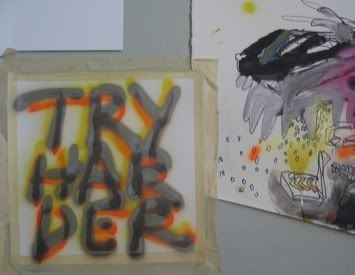Look! MOCAD in the NY Times!
The article is mostly about the architect Andrew Zago, the location and a description of the space. Great to see in the Times! Don't miss the slide show of artwork too!
..."By comparison, Mr. Zago draws inspiration from the squatters' houses, performance spaces, local bars and grass-roots art projects that have sprouted amid the disturbing stillness of the neighborhoods: a kind of forgotten underworld tucked into ruined houses and storefronts surrounded by lots that have been abandoned for so long that they have become overgrown fields."...nytimes



15 Comments:
Woo-hoo!!! The Big Apple! Did they mention that MOCAD is in Detroit? Tim Allen is from here too.
You make Detroiters sound like that ornery and virulent grandpa who sits unhappy. When you offer to get him a drink he just yells at you to leave him alone and returns to his misery.
It was a good article. Definitely better than no article.
Thank you for introducing me to this wonderful oeuvre.
Thank you for sharing this with us.
Sincerely,
Pedro Nunes
Don't get your panties in a bunch.
Detroiters are surly. It comes with the territory.
it wasn't a good article. it was a really dumb article. and insulting to detroit and mocad itself.
vago's vision "found in an abandoned section of the city..." yeah, with a four star restaurant across the street.
and what architectural vision. because it's got bathrooms now?!
didn't celebrate anything but stereotypes of Detroit.
"...Like those projects, resolutely informal, Mocad creates a casual and intimate relationship between art and viewer, shrugging off the weighty air of authority and privilege that is typical of so many museums. It takes us back to a time when making art and architecture could be a act of dissent."
I would really like to believe this.
I think that Zago's vision has more to do with an extremely limited budget than an authentic vision. The article is quite a spin.
impaired vision. due to lack of any real funding at the moment.
I didn't want to be the first to say anything, but even the title was a little under-handed : "seeing the seedy and celebrating it". That's not exactly a compliment.
I'd really like to see before and after pictures of Zago's "vision", and I like that the article credits him with the idea of installing large garage-type doors on one side... and abandoned car dealership, I can't imagine those doors might have already been there...
As for funding: that's a cop-out. You can do a lot more with a lot less than what MOCAD has.
Any one of several people on the current board has very deep pockets and could have made this happen from the get-go. Taubman, Manoogian, Karmanos ... to name a few.
It seems more like lip-service to a dream than anything real.
That article made the NYT's online most read list yesterday. Seedy. Detroit. Who knew?
As an architect myself, this article is an embarrassing joke. I'm not quite sure who the joke is on, there are so many candidates: in the end, maybe it should just be shared by both the NY Times and Vago.
The guy puts up some fluorescent lights and ceiling heaters in an abandoned building and suddenly he's the new Frank Gehry.
What a load!
I couldn't agree more Jon K. The museum is sub-utilitarian at best and spoken of as a new direction or movement almost initiated by Zago. Give me a break.
I'm wondering about the archival effects of ceiling heaters. Maybe it doesn't matter because there's no permanent collection, but then the papers loaned to the Wright museum and subsequently destroyed weren't in a permanent collection either.
Post a Comment
<< Home